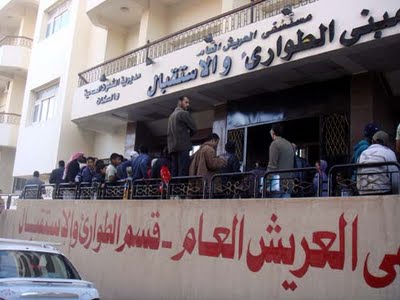Egyptians are accustomed to election fraud, having witnessed very few fair elections in their modern history. The events that took place during the 28 November parliamentary elections are nothing new. Many of the manipulation tactics used during the race have been deployed before–for example, during the infamous 1995 elections which lacked proper judicial oversight and were blighted by widespread fraud and abuses.
The difference this year was in the way the ruling National Democratic Party (NDP) chose its candidates and the unprecedented scale of manipulation that took place.
The NDP’s candidate selection process was marred by internal discord and suffered from a lack of political sophistication. The party allowed 800 candidates to compete for 508 seats, with many candidates competing against each other in “open constituencies,” destroying whatever sense of party belonging they may have had.
Moreover, the NDP forced its candidate hopefuls to grant power of attorney status the the party’s secretary of organizational affairs, Ahmed Ezz, before the selection process was complete. This was intended to prevent those who were not selected from leaving the party to run independently against official NDP candidates.
What kind of party fears its own members suddenly turning against it if they are not chosen as candidates? If this is how the NDP deals with its own members how do we expect it to deal with other parties or with the Egyptian public?
The sad truth is that the situation in Egypt has gone from bad to worse over the past few decades.
Take for example the decision by Ezz, a prominent steel tycoon and member of the NDP’s influential Policies Secretariat, to oust certain members of parliament whose track records were not to his liking–Mustafa Bakri, Alaa Abdel Moneim, Gamal Zahran, and Hamdeen Sabahy. The move is reminiscent of late President Anwar Sadat’s decision to bar 13 candidates from the 1979 election who opposed the Camp David Accords and criticized the president’s political orientations.
The difference between the events of 1979 and 2010 is that President Sadat was defending a political ideology, even if misguided, but today NDP leaders defend little more than their personal interests.
The revenge philosophy dominating the NDP’s new leadership has paved the way for violence and thuggery, often with the compliance of the police. This year’s race saw high levels of bullying, vote-buying and other fraudulent practices. Many voters stayed away from the ballot boxes, not only because the election outcome was already known but also because they were pushed away, figuratively and physically.
As a result, we will have an NDP-dominated parliament, which will include no more than 20 opposition members.
The shameful manner in which the elections were manipulated demonstrate the NDP’s failure to transform into a serious party (or parties) and undertake real democratic change. Instead, the ruling party has spoiled state institutions–including the security forces and administrative and judicial authorities–with its corrupt practices. The result is the worst election in Egypt’s history.
The NDP counts many reformers among its ranks, but it has been hijacked by a small group that has done nothing to stop election fraud. In fact, what’s happened is the opposite–they’ve allowed fraud to spread widely, creating a state of chaos that is surely not the handiwork of an organized political party.
This small clique now stands above the ruins of Egypt's state institutions, political parties and poor citizens who have been ruthlessly crushed. Those holding the reins of the ruling party are indeed playing with fire.
Translated from the Arabic Edition.




